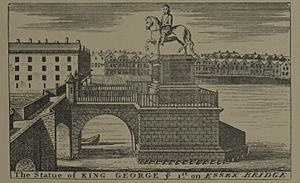Equestrian statue of George I, Birmingham facts for kids
The Equestrian statue of George I is a cool bronze statue of King George I riding a horse. It was made by an artist named John van Nost the Elder. You can find this statue outside the Barber Institute of Fine Arts in Birmingham, England.
Contents
Why the Statue Was Made
This statue was ordered by the city of Dublin in 1717. They wanted to show their loyalty to King George I. He had become King of Great Britain and Ireland in 1714. At the time, some people in Ireland supported James Stuart to be king instead. So, the statue was a way for Dublin to show they were on King George's side.
What the Statue Looks Like
The statue shows King George I wearing clothes from his own time. But he also has a laurel wreath on his head, which was a style from ancient Rome. It's thought that some of van Nost's students might have helped finish the statue.
The Statue's Journey
First Home in Dublin
The statue was first put on display in Dublin on Essex Bridge. This bridge is now called Grattan Bridge. It stood there from 1722 until sometime between 1753 and 1755. It was moved because the water flowing around its base was causing damage to the bridge. George Semple, who was rebuilding the bridge, decided to remove it.
Moving to Mansion House
In 1798, the statue was put up again. This time, it was placed in the gardens of Dublin's Mansion House. It stayed there for many years.
Finding a New Home in Birmingham
In 1937, the statue was bought for the Barber Institute of Fine Arts in Birmingham. The institute's first director, Thomas Bodkin, helped bring it there. He had previously worked at the National Gallery of Ireland.
Protecting the Statue
In July 1982, the statue was given special legal protection. It was named a Grade II listed structure. This means it is an important historical artwork. This protection helps make sure no one can remove or change it without permission.
 | Aurelia Browder |
 | Nannie Helen Burroughs |
 | Michelle Alexander |


